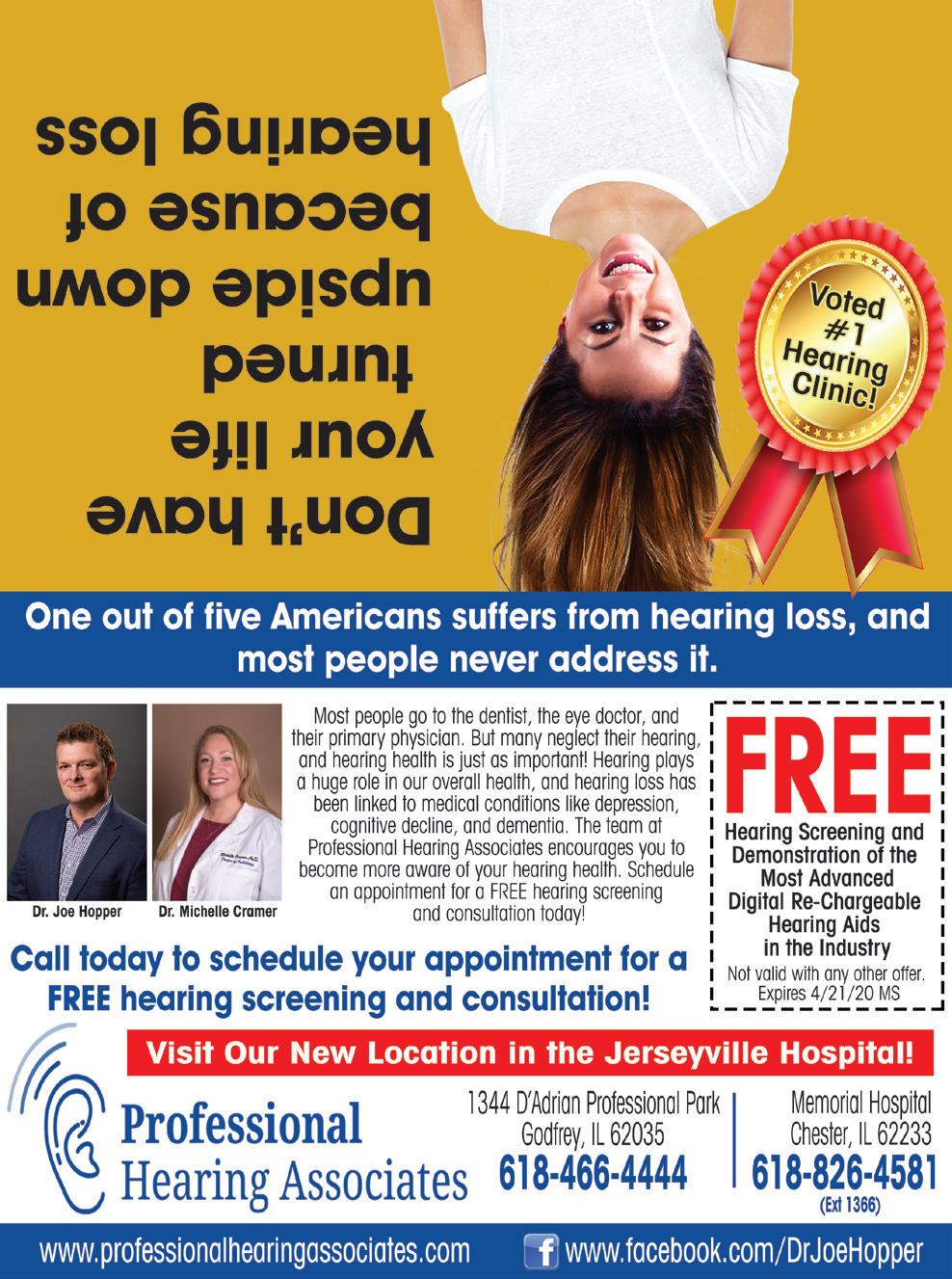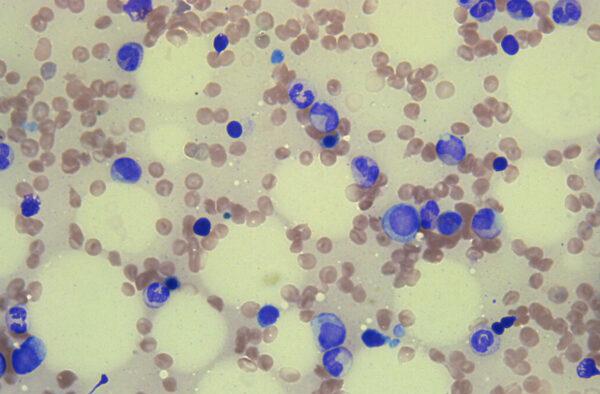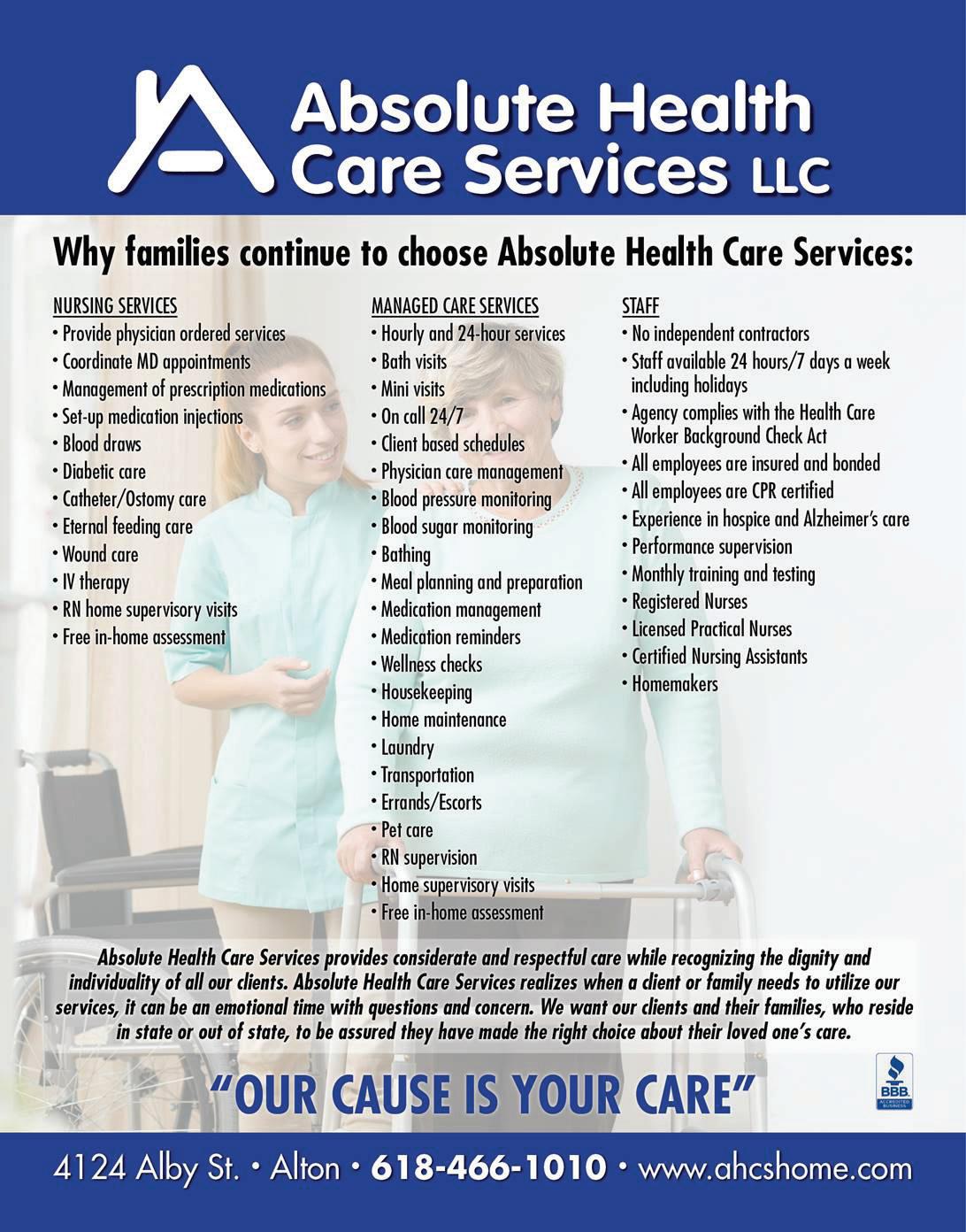
16 minute read
Mutations in donors’ stem cells may cause problems
Mutations in donors’ stem cells may
cause problems for cancer patients
Special to Active Lifestyles
ST. LOUIS — A stem cell transplant — also called a bone marrow transplant — is a common treatment for blood cancers, such as acute myeloid leukemia (AML). Such treatment can cure blood cancers but also can lead to life-threatening complications, including heart problems and graft-versus-host disease, in which new immune cells from the donor attack a patient’s healthy tissues.
A new study from Washington University School of Medicine in St. Louis suggests that extremely rare, harmful genetic mutations present in healthy donors’ stem cells — though not causing health problems in the donors — may be passed on to cancer patients receiving stem cell transplants. The intense chemo and radiation therapy prior to transplant and the immunosuppression given after, allow cells with these rare mutations the opportunity to quickly replicate, potentially creating health problems for the patients who receive them, suggests the research, published Jan. 15 in the journal Science Translational Medicine.
Among the concerns are heart damage, graft-versus-host disease and possible new leukemias.
The study, involving samples from patients with AML and their stem cell donors, suggests such rare, harmful mutations are present in surprisingly young donors and can cause problems for recipients even if the mutations are so rare as to be undetectable in the donor by typical genome sequencing techniques.
Call today to schedule your appointment for a FREE hearing screening and consultation!




Most people go to the dentist, the eye doctor, and their primary physician. But many neglect their hearing, and hearing health is just as important! Hearing plays a huge role in our overall health, and hearing loss has been linked to medical conditions like depression, cognitive decline, and dementia. The team at Professional Hearing Associates encourages you to become more aware of your hearing health. Schedule an appointment for a FREE hearing screening and consultation today!
Hearing Screening and Demonstration of the Most Advanced Digital Re-Chargeable Hearing Aids in the Industry Not valid with any other offer. Expires 4/21/20 Tel FREE
The research opens the door to a larger study that will investigate these rare mutations in many more healthy donors, potentially leading to ways to prevent or mitigate the health effects of such genetic errors in patients receiving stem cell transplants.
“There have been suspicions that genetic errors in donor stem cells may be causing problems in cancer patients, but until now we didn’t have a way to identify them because they are so rare,” said senior author Dr. Todd E. Druley, an associate professor of pediatrics.
“This study raises concerns that even young, healthy donors’ blood stem cells may have harmful mutations and provides strong evidence that we need to explore the potential effects of these mutations further.”
“Transplant physicians tend to seek younger donors because we assume this will lead to fewer complications,” said co-author Dr. Sima T. Bhatt, an assistant professor of pediatrics who treats pediatric patients with blood cancers at Siteman Kids at St. Louis Children’s Hospital and Washington University School of Medicine. “But we now see evidence that even young and healthy donors can have mutations that will have consequences for our patients. We need to understand what those consequences are if we are to find ways to modify them.”
The study analyzed bone marrow from 25 adult patients with AML whose samples had been stored in a repository at Washington University. Samples from their healthy matched donors, who were unrelated to the patients, also were sequenced. The donors’ samples were provided by the Center for International Blood and Marrow Transplant Research in Milwaukee, Wisconsin.
The 25 AML patients were chosen because they each had had samples banked at four separate times: before the transplant, at 30 days post-transplant, at 100 days post-transplant, and one year post-transplant.
Druley co-invented a technique called error-corrected sequencing, to identify extremely rare DNA mutations that would be missed by conventional genome sequencing. Typical next-generation sequencing techniques can correctly identify a mutation that is present in one in 100 cells. The new method, which can distinguish between true mutations and mistakes introduced by the sequencing machine, allows the researchers to find true mutations that are extremely rare — those present in as few as one in 10,000 cells.
The healthy donors ranged in age from 20 to 58, with an average age of 26. The researchers sequenced 80 genes known to be associated with AML, and they identified at least one harmful genetic mutation in 11 of the 25 donors, or 44%. They further showed that 84% of all the various mutations identified in the donors’ samples were potentially harmful, and that 100% of the harmful mutations present in the donors later were found in the recipients. These harmful mutations also persisted over time, and many increased in frequency. Such data suggest the harmful mutations from the donor confer a survival advantage to the cells that harbor them.
“We didn’t expect this many young, healthy donors to have these types of mutations,” Druley said. “We also didn’t expect 100% of the harmful mutations to be engrafted into the recipients. That was striking.”
According to the researchers, the study raises questions about the origins of some of the wellknown side effects of stem cell transplantation.
“We see a trend between mutations from the donor that persist over time and the development of chronic graft-versus-host
disease,” said first author Wing Hing Wong, a doctoral student in Druley’s lab. “We plan to examine this more closely in a larger study.”
Though the study was not large enough to establish a causal link, the researchers found that 75% of the patients who received at least one harmful mutation in the 80 genes that persisted over time developed chronic graft-versus-host disease. Among patients who did not receive mutations in the 80 genes, about 50% developed the condition. Because the study was small, this difference was not statistically significant, but it is evidence that the association should be studied more closely. In general, about one half of all patients who receive a stem cell transplant go on to develop some form of graft-versus-host disease.
The most common mutation seen in the donors and the cancer patients studied is in a gene associated with heart disease. Healthy people with mutations in this gene are at higher risk of heart attack due to plaque buildup in the arteries.
“We know that cardiac dysfunction is a major complication after a bone marrow transplant, but it’s always been attributed to toxicity from radiation or chemotherapy,” Druley said. “It’s never been linked to mutations in the blood-forming cells. We can’t make this claim definitively,
For Active Lifestyles A new study from Washington University School of Medicine in St. Louis suggests that bone marrow — or blood stem cells — from healthy donors can harbor extremely rare mutations that can cause health problems for the cancer patients who receive them. Such stem cell transplants are important for treating blood cancers, including acute myeloid leukemia. In the healthy bone marrow pictured, mature red blood cells are shown as small brownish-pink discs; red blood cells that are still developing are in deep blue; and, developing white blood cells are in lighter blue.

but we have data to suggest we should study that in much more detail.”
“Now that we’ve also linked these mutations to graft-versushost disease and cardiovascular problems,” said Bhatt, “we have a larger study planned that we hope will answer some of the questions posed by this one.” This work was supported by the National Cancer Institute (NCI) of the National Institutes of Health (NIH); Hyundai Quantum Award; Leukemia and Lymphoma Society Scholar Award; Eli Seth Matthews Leukemia Foundation; and, Kellsie’s Hope Foundation.
The Washington University Office of Technology Management has filed a patent application for “Ultra-rare Variant Detection from Next-generation Sequencing,” which has been licensed by Canopy Biosciences as RareSeq. Druley is a co-inventor on this patent. Canopy Biosciences was not involved in the generation of the data presented.
Vaccinations – adults get them, too
OSF HealthCare Saint Anthony’s Health Center Special to Active Lifestyles
ALTON — When you think of immunizations, naturally the first thing that comes to mind are milestones of a child’s life – from the first vaccinations they receive when they’re just weeks old until the ones they get as they go off to college.
But it’s important for adults to remember immunizations are something they also should discuss with their primary care provider.
Dr. Laura Roe, with OSF Medical Group – Metamora, said there are several reasons adult immunizations are a hot topic these days.
“First, I think all of us becoming more and more focused on our health and preventive medicine – which include vaccines – is a major part of staying healthy,” she said. “Second, I think the overall attention to vaccinations in the media, especially in regards to childhood immunizations and the recent outbreak of measles across the country, has brought the issue into greater focus for adults. And third, in the past 20 years or so, there has been great advancement in adult vaccines against various diseases.”
Immunizations for adults Even if an adult was fully immunized as a child, they still need to know what immunizations are important as they move through adulthood, Dr. Roe said.
A number of vaccines available to adults should be considered, she said. Example include:
• Influenza vaccine – These are recommended for anyone age 6 months or older to protect against the influenza virus. The vaccine is offered seasonally and patients should get a flu shot by the end of October. Influenza is a respiratory illness that is caused by a virus. It can cause mild or severe illness and even death. The best way to guard against
See VACCINATIONS | Page 14 Active Lifestyles
From page 13
14 February 2020 getting the flu is to get a flu vaccine each year.
• Tetanus vaccine – Tetanus vaccines are recommended for people of all ages. Tetanus is an infection caused by a bacteria. The bacteria produces spores found in the environment, in dust, dirt and soil. The spores can enter the body through broken skin, from an injury such as a cut or a puncture wound. Although tetanus is rare, it can cause serious health problems and even death. There are several vaccines that protect against tetanus as well as other illnesses. Most adults should get a Td booster every 10 years (this protects against both tetanus and diphtheria). Pregnant women should receive the Tdap vaccine (which protects against tetanus, diphtheria and pertussis/whooping cough) during the third trimester to help protect against whooping cough in infants. This can be given regardless of last tetanus immunization. Adults who have never received Tdap should also get one dose of Tdap in place of a dose of Td “I particularly remind patients who are going to be fathers, grandparents or coming in frequent contact with a newborn baby of this recommended vaccine,” Dr. Roe said. “Once you have had one Tdap dose as an adult, you don’t need to repeat the dose. It is important if you have a wound, such as a cut or puncture, that you check with your doctor to make sure your tetanus immunization is up to date.”
• HPV vaccine – The HPV vaccine protects against human papillomavirus (HPV). HPV is a common virus that is passed by direct skin contact during sexual activity. Most sexually active men and women will get HPV in their lifetime. Most will not be aware they have been infected, as the virus often causes no symptoms. Some types of HPV can cause cancer and genital warts. HPV can cause cervical cancer, as well as genital and oral cancer. The vaccine protects against the HPV types that most commonly cause cancer and genital warts. The vaccine is recommended in children starting at age 11, but some adults should receive the vaccine as well. For adults who did not receive the vaccine as a child, the HPV vaccine is recommended for men up to age 21 and women up to age 26. However, the Federal Drug Administration recently approved the use of the HPV vaccine in men and women ages 27 to 45.
• Pneumonia vaccine – Pneumonia vaccines protect against specific strains of the pneumococcal bacteria. These bacteria commonly cause pneumonia as well as other infections. There are two different vaccines to protect against pneumococcal bacteria. The first is Prevnar 13 (PCV 13). This vaccine is recommended for all adults 65 or older as well as adults under 65 with an immune-compromising condition. The second vaccine is pneumovax 23 (PPSV 23). This is recommend for all adults 65 and older as well as adults aged 19-65 who smoke or have other chronic medical conditions.
• Shingles vaccine – Shingles is a blistering, painful rash that can have lasting complications. It occurs in people who have had the chicken pox in the past and the chicken pox virus reactivates. There are currently two vaccines available for shingles: Shingrix and Zostavax. Shingrix is the preferred vaccine as it is not a live vaccine and is more effective than Zostavax.
• MMR vaccine – With the recent rise of measles cases, measles has been getting more attention. People born between 1957 and 1989 likely only received one dose of the measles vaccine. As a result, they may not be fully protected. Certain groups of people are at increased risk of contracting measles and should ensure they have had two MMR vaccines. Those include college students, health care workers and international travelers. Your doctor can help you determine if you need a booster or testing for measles immunity.
• Hepatitis A and Hepatitis B – There are serious infections of the liver caused by a virus. The Hep A virus is transmitted by contaminated food or water. The Hep B virus is transmitted when blood or other bodily fluids enter the body of an uninfected person. The Hep A vaccine is recommended for all adults, but would especially be recommended for anyone who travels. The Hep B vaccine is recommended for certain populations, including people at risk for exposure to blood (such as health care workers and dialysis patients), people at risk for sexual exposure and people with hepatitis C, HIV or chronic liver disease.
Protecting yourself and those around you

“Adults need to remember that immunizations are safe and effective with very few side effects,” Dr. Roe said. “Also, getting immunized not only protects yourself but helps to protect those around you. I sometimes have adults say they don’t need the flu shot because they are young and healthy, but they may be around young children or elderly people who are more vulnerable.
“I would recommend any time you are unsure about whether a vaccine is needed, you should be asking your doctor, ‘Why should I get this vaccine?’ Often, I will have patients tell me they don’t need a particular vaccine, but when I explain why we have the vaccine and what the consequences of not vaccinating may be or how that vaccine could protect them, they often reconsider,” she said. “The bottom line is that the more information you have, the better you will be able to make a decision.”
In addition, Dr. Roe recommends international travelers visit the Centers for Disease Control and Prevention, or the World Health Organization websites for travel advisories and information on vaccines and outbreaks by travel destination.
Schedule an appointment with your doctor and ask about what vaccines you should be getting to protect yourself and those around you. If you need a primary care provider, osfsaintanthonys.org and click on “Find a Doctor.”
NURSING SERVICES • Provide Physician ordered services • Coordinate MD appointments • Management of prescription medications • Set-up Medications • Injections • Blood draws • Diabetic care • Eternal feeding care • Wound care • IV Therapy • RN home supervisory visits • Free in-home assessment



MANAGED CARE SERVICES • Hourly and 24 -hour services • Bath visits • Mini visits • On call 24/7 • Client based schedules • Physician care management • Blood pressure monitoring • Bathing • Meal planning and preparation • Medication management • Medication reminders • Wellness checks • Housekeeping • Home maintenance • Laundry • Transportation • Errands/Escorts • Pet care • RN supervision • Home supervisory visits • Free in-home assessment
STAFF • No independent contractors • Staff available 24 hours/7 days a week including holidays • Agency complies with the Health Care Workers Background Check Act • All employees are insured and bonded • Experience in Hospice and Alzheimer’s care • Performance supervision • Monthly training and testing • Registered Nurses • Licensed Practical Nurses • Certified Nursing Assistants • Homemakers


Voted #1 2018 & 2019
Absolute Health Care Services provides considerate and respectful care while recognizing the diginty and individuality of all of our clients. Absolute Health Care Services realizes when a client or family needs to utilize our services, it can be an emotional time with questions and concerns. We want our clients and their families to be assured they have made the right choice about their loved one’s care.
4124 Alby St. • Alton • 618-466-1010 • www.ahcsllc.com
It’s personal. CANCER. Will I be able to work? How will I get to treatments? Will I lose my hair? Will I see my children grow up? Where do I find hope? Because no two cancers are alike, our team at OSF HealthCare Saint Anthony’s Health Center will personalize a treatment plan to meet your needs. That is why we designed the new OSF Moeller Cancer Center as an all-in-one facility, so you can focus on what is important to you – getting back to your life. We’re by your side from diagnosis through treatment. Because for all of us – it’s personal. It’s personal. CANCER. Will I be able to work? How will I get to treatments? Will I lose my hair? Will I see my children grow up? Where do I find hope? Because no two cancers are alike, our team at OSF HealthCare Saint Anthony’s Health Center will personalize a treatment plan to meet your needs. That is why we designed the new OSF Moeller Cancer Center as an all-in-one facility, so you can focus on what is important to you – getting back to your life. We’re by your side from diagnosis through treatment. Because for all of us – it’s personal. It’s personal. CANCER. Will I be able to work? How will I get to treatments? Will I lose my hair? Will I see my children grow up? Where do I find hope? Because no two cancers are alike, our team at OSF HealthCare Saint Anthony’s Health Center will personalize a treatment plan to meet your needs. That is why we designed the new OSF Moeller Cancer Center as an all-in-one facility, so you can focus on what is important to you – getting back to your life. We’re by your side from diagnosis through treatment. Because for all of us – it’s personal.
To learn more, visit osfhealthcare.org/cancercare.









